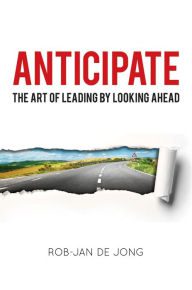
The old adage about creating a habit went something like this: It takes three weeks (or about 21 days) to create a permanent change in your behavior.
However, now the conventional wisdom is that habits take much longer to set up shop in our behavior. As a result, habits can be a trap for people in leadership positions. Habits that are in place for months or years can harm a business because people are set in their ways.
 “Too often, we don’t come up with imaginative solutions because we let ourselves be ruled by routine and by preconceived notions,” says Rob-Jan de Jong, a behavioral strategist and author of “Anticipate: The Art of Leading By Looking Ahead.”
“Too often, we don’t come up with imaginative solutions because we let ourselves be ruled by routine and by preconceived notions,” says Rob-Jan de Jong, a behavioral strategist and author of “Anticipate: The Art of Leading By Looking Ahead.”
de Jong is an expert lecturer at various leading business schools such as the Wharton Business School (USA), Thunderbird School of Global Management (USA), Nyenrode Business University (The Netherlands) and Sabanci Business University (Turkey). As a behavioral strategist, he speaks, teaches and consults on executive subjects such as visionary leadership, influence, strategic decision-making, and innovation.
“We think we know ahead of time what will and won’t work, which makes us quick to dismiss ideas that sound too ‘out there.’ The people who answer to you learn the lesson that creative thinking is frowned upon, even if that’s not the lesson you wanted to teach.”
 Simply making a New Year’s resolution to have a more open mind in 2016 likely won’t be enough to turn things around. But de Jong says there are behaviors and practices that, through repetition and perseverance, can help leaders and anyone else develop a mindset that’s open to imaginative and better ideas.
Simply making a New Year’s resolution to have a more open mind in 2016 likely won’t be enough to turn things around. But de Jong says there are behaviors and practices that, through repetition and perseverance, can help leaders and anyone else develop a mindset that’s open to imaginative and better ideas.
• Formulate powerful questions. Generating ideas starts with asking the right questions and the best questions are thought-provoking. They challenge underlying assumptions and invite creativity. “They also give us energy, making us aware of the fact there is something to explore that we hadn’t fully grasped before,” de Jong says. Train yourself to catch poorly designed questions, asked by you or someone else, and reformulate them.
• Expand your sphere of influence. “We are strongly influenced, for better or worse, by the small group of people we have direct contact with,” de Jong says. “Since we tend to hang out with people who are fairly similar to ourselves, chances are we are limiting our perspectives.” He recommends making a deliberate effort to encounter people and ideas that are “profoundly different from the usual suspects you hang out with.” Visit a conference of a different profession, hang out with skaters, join an arts club or buy a magazine randomly off the shelf.
• Break your patterns. You can increase your chances of seeing things differently if you deliberately break your normal pattern of working, communicating, thinking, reacting and responding, de Jong says. Take a different route to work. Change where you sit in meetings. If you are normally the first to volunteer, hold back.
• Learn to listen. “We’ve all been taught the importance of being good listeners,” de Jong says. “The problem is most of us struggle to actually do it.” Often when people are “listening,” they really are waiting for the first opportunity to share their story, their opinion or their experience. De Jong suggests training yourself to engage in three pure listening conversations a week. They don’t need to be longer than 15 to 20 minutes, they can be formal or informal, and the other person doesn’t need to know what you’re doing.



